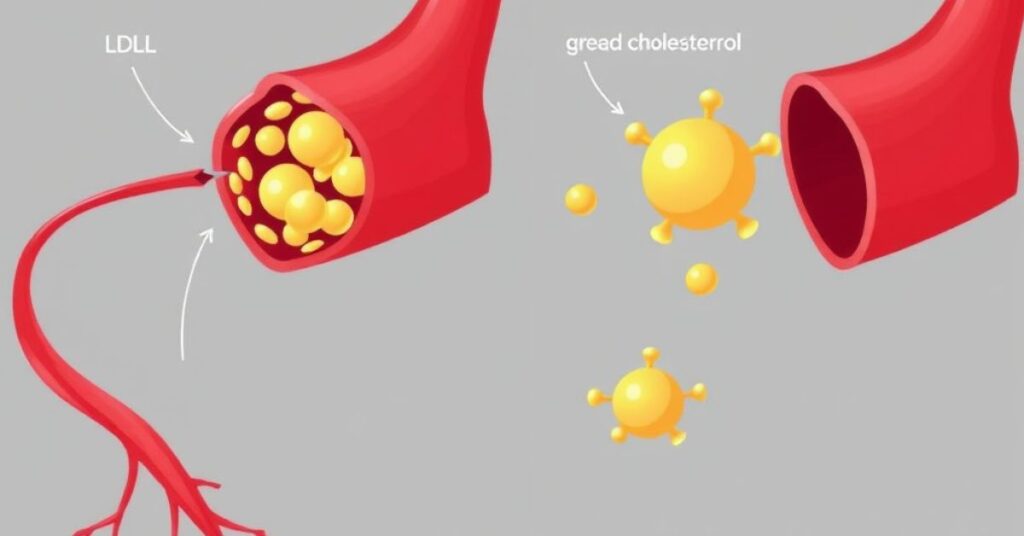
05 Feb Can High Cholesterol Cause Headaches – Find Out Now!
High cholesterol is a common health problem that many people have, but its effects on your health might not be clear right away. A question that often comes up is whether high cholesterol can cause headaches. In this article, we’ll look at how high cholesterol and headaches might be connected, explain why it could happen, and give you simple tips to manage both and stay healthy. Understanding this link can help you make better choices for your overall well-being.
What Is High Cholesterol?

Cholesterol is a waxy substance found in your blood. While your body needs it to build healthy cells and produce important hormones, having too much cholesterol can cause serious health problems. Cholesterol is transported through your bloodstream by two main types of lipoproteins:
- Low-Density Lipoprotein (LDL): Often referred to as “bad” cholesterol. High levels of LDL cholesterol can lead to the buildup of plaque in your arteries, which can restrict blood flow and increase your risk of heart disease, stroke, and other cardiovascular issues.
- High-Density Lipoprotein (HDL): Known as “good” cholesterol, HDL helps remove LDL cholesterol from your bloodstream, reducing the risk of plaque buildup and helping to protect your heart and arteries.
How Does High Cholesterol Affect Your Health?
When your cholesterol levels are too high, it can lead to a number of serious health conditions:
Atherosclerosis:
The buildup of plaque in the arteries, which can restrict or block blood flow. This narrowing of the arteries makes it harder for blood to circulate freely. As a result, the heart has to work harder to pump blood, which can increase the risk of blood clots. Over time, this can lead to serious complications such as heart attacks or strokes.
Heart Disease:
Narrowed or blocked arteries increase your risk of heart attacks, as the heart struggles to receive enough oxygen and nutrients. The reduced blood flow can damage the heart muscle, leading to chest pain (angina) or even a heart attack. If left untreated, heart disease can worsen, making it harder for the heart to function properly. This can eventually lead to heart failure.
Stroke:
A blocked artery in the brain can lead to a stroke, potentially causing permanent brain damage. Strokes occur when the brain is deprived of oxygen and nutrients, which can damage brain cells. Depending on the area of the brain affected, strokes can lead to a range of symptoms, including paralysis, speech problems, and memory loss. Quick treatment is essential to reduce the damage caused by a stroke.
High Blood Pressure:
High cholesterol can increase blood pressure by narrowing the arteries, making the heart work harder to pump blood through them. As the blood flow becomes more restricted, the pressure within the blood vessels rises. Over time, high blood pressure can lead to heart damage, kidney problems, and even vision loss. Managing both high cholesterol and high blood pressure is key to reducing the risk of these serious conditions.
Can High Cholesterol Cause Headaches?
The relationship between high cholesterol and headaches is indirect but still significant. While high cholesterol does not directly cause headaches, it can lead to conditions that increase the risk of experiencing them. Here’s how:
1. Reduced Blood Flow to the Brain:
High cholesterol can cause the arteries to narrow and harden, a process known as atherosclerosis. This can reduce the flow of oxygen-rich blood to various organs, including the brain. As a result, people with high cholesterol may experience symptoms like dizziness, blurred vision, and sometimes headaches. The lack of proper blood flow can be a triggering factor for headache pain.
2. Increased Risk of High Blood Pressure:
High cholesterol and high blood pressure often go hand in hand. When the arteries become clogged with cholesterol plaque, it can increase the pressure in the blood vessels. High blood pressure, or hypertension, is a well-known headache trigger. The pressure buildup can cause tension headaches or even lead to more severe conditions like a migraine.
3. Heart Disease and Stroke:
If high cholesterol leads to heart disease or a stroke, one of the potential symptoms can be a headache. A stroke, for example, can cause a sudden and intense headache, often described as the worst headache of one’s life. Although strokes are not directly caused by cholesterol, the high cholesterol levels that lead to plaque buildup and arterial blockage increase the risk of stroke.
4. Stress and Anxiety Related to High Cholesterol:
Dealing with high cholesterol can lead to stress and anxiety, particularly if you are concerned about the long-term health risks. Stress is another major contributor to headaches, especially tension headaches. Constant worry and stress about your health can trigger or worsen headaches.
READ MORE: Bad Headache During Colonoscopy Prep – Causes & Relief Tips!
Other Factors That Contribute to Headaches:
It’s important to note that while high cholesterol can contribute to headaches, there are many other potential causes. Here are some common triggers to consider if you’re experiencing frequent headaches:
- Dehydration: Not drinking enough water can lead to dehydration, a common cause of headaches.
- Sleep Issues: Poor sleep quality or not getting enough rest can increase the likelihood of developing headaches.
- Stress: Emotional or physical stress is one of the most common causes of tension headaches.
- Caffeine Withdrawal: If you regularly consume caffeine and suddenly stop or reduce your intake, you may experience withdrawal headaches.
- Diet: Certain foods, such as processed meats, chocolates, or foods high in sugar, may trigger headaches in some individuals.
How to Manage High Cholesterol and Headaches?
Managing both high cholesterol and headaches is crucial for improving your overall health and quality of life. Here are some practical tips to help you manage both conditions:
1. Monitor Your Cholesterol Levels Regularly:
It’s essential to have your cholesterol levels checked regularly by a healthcare provider. Regular monitoring can help you track your cholesterol levels and take steps to lower them before they cause significant health problems. Depending on your cholesterol levels, your doctor may recommend changes to your diet, exercise routine, or prescribe medications to help lower cholesterol.
2. Maintain a Healthy, Cholesterol-Friendly Diet:
Eating a heart-healthy diet is one of the most effective ways to manage high cholesterol. Focus on foods that can help lower LDL cholesterol levels and promote overall health:
- Fruits and Vegetables: Rich in fiber and antioxidants, these foods help lower cholesterol levels and protect your heart.
- Whole Grains: Foods like oats, brown rice, and quinoa are high in fiber and can help lower LDL cholesterol.
- Fatty Fish: Fish such as salmon, mackerel, and sardines are high in omega-3 fatty acids, which help lower cholesterol.
- Nuts and Seeds: Almonds, walnuts, and flaxseeds are great for heart health and can help reduce cholesterol.
- Limit Unhealthy Fats: Avoid trans fats and saturated fats, which are commonly found in processed foods and can raise your LDL cholesterol.
3. Exercise Regularly:
Regular physical activity is essential for managing both high cholesterol and headaches. Exercise helps raise HDL (good) cholesterol levels, lower LDL (bad) cholesterol, and reduce blood pressure. Exercise also helps reduce stress, which is a common headache trigger.
4. Stay Hydrated:
Drinking enough water is crucial for preventing dehydration headaches. Aim to drink at least 8 cups (64 ounces) of water a day, and more if you’re physically active or live in a hot climate.
5. Practice Stress Management Techniques:
Stress can exacerbate both high cholesterol and headaches. Consider practicing relaxation techniques to manage stress effectively:
- Deep Breathing Exercises: Inhale slowly through your nose, hold for a few seconds, and exhale slowly through your mouth.
- Yoga: Yoga combines physical movement with deep breathing and can help reduce both physical and mental stress.
- Meditation: Regular meditation can help calm the mind and reduce anxiety and stress.
6. Get Enough Sleep:
Lack of sleep can contribute to both high cholesterol and headaches. Aim for 7-9 hours of quality sleep each night to improve overall health and reduce the frequency of headaches.
FAQs:
Q: Can lowering cholesterol help with headaches?
Yes, lowering cholesterol can improve overall circulation and blood flow, potentially reducing the risk of headaches related to high blood pressure or narrowed arteries.
Q: What foods help lower cholesterol?
Foods rich in fiber, such as oats, beans, and fruits, as well as fatty fish, nuts, and seeds, can help lower cholesterol.
Q: How can I prevent headaches?
Stay hydrated, manage stress, get enough sleep, and avoid known headache triggers like dehydration, caffeine withdrawal, or poor diet
Conclusion:
While high cholesterol does not directly cause headaches, it can contribute to several conditions that may trigger headaches, such as high blood pressure, reduced blood flow, and stress. By managing your cholesterol levels and adopting a healthy lifestyle, you can help reduce the risk of both high cholesterol and headaches. If you are experiencing frequent headaches and have high cholesterol, it’s a good idea to consult your doctor for personalized advice and treatment.

No Comments